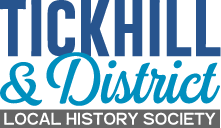

Tickhill Library
(The photographs which relate to this topic are in the Gallery section of the website.)
Tickhill Library was opened on Wednesday October 7, 1908 by Lord Scarbrough of nearby Sandbeck Hall. His Lordship praised the new building and said that '...access to good standard literature was looked upon as a necessary adjunct of our educational system in all up-to-date towns’.
The library was the result of the generosity of Henry Shaw, a native of Tickhill, who had made his fortune from Balby Brickworks and other speculative ventures. He had died two years earlier, and had left a site on Castlegate for a library valued at £500, and £1,500 for building, on condition that Tickhill Urban District Council took responsibility for the construction and the provision of a library service.
Doncaster architect, Philip N Brundell was chosen to design the building, and local builders, Messrs Rawson & Sons submitted the lowest tender for construction.
The building of Conisbrough red brick with Mansfield stone dressings had an imposing front and stone doorway and was surmounted by a fine four-face clock supplied by Mr Fretwell of High Street, Doncaster. It contained a large, lofty room for use as a reading room, lecture hall or concert hall, beyond were magazine rooms for ladies and gentlemen and a lavatory; there was a large basement for storage. The building was lit by gas and had heating installed by Carter Longbottom of High Street, Doncaster.
The official opening was presided over by Councillor T Guest, Chairman of the Council, together with Council members, the Vicar, Rev A D Alderson and other invited guests, whom the Doncaster Gazette described as ‘some of the most influential in the district’. However, whilst they were gathered to open, what was unquestionably, a fine building, there was a slight problem. Following death duties, the value of Henry Shaw’s gift had been reduced to £1,300, and the Council had used all their funds allocated to the project on the construction, consequently the Library had no furniture, staff or books.
In his speech the Rev Alderson said that he hoped the people of Tickhill would be generous and donate books or money for books. He would be glad to give a guinea or a guinea’s worth of books, and he was sure Lord Scarbrough would support the cause as the Library would brighten and enlighten the lives of Tickhill people.
Lord Scarbrough said he would be ‘very glad to help the cause in any way he could’ and he urged the people of Tickhill to do likewise.
An 1855 amendment to the 1850 Public Libraries Act gave the Council the power to levy a 1d rate towards a library service, but Councillor C D Nicholson said, ‘ It is not a question on a penny rate or a twopenny rate. It was a question of putting their hands in their pockets to furnish the building and supply it with good books.’
Andrew Carnegie, the Scottish born, American steel magnate and philanthropist, who gave so generously to establish libraries in English speaking countries throughout the world, had been approached for assistance but failed to reply. He was known to favour those who helped themselves, and as the site and construction had been paid for by Henry Shaw, possibly felt that Tickhill should support the service itself.
Unfortunately, donations of money and books were not forthcoming and the building’s only literary use was the reading room for newspapers; it was mainly used as a venue for dances and meetings, as council offices and a village hall. In the 1970s it was converted into a youth centre.
It was to be over 50 years before Tickhill had a regular library service: the West Riding County Council provided a mobile library service, followed, several years later, by the opening of a temporary library building on the opposite side of Castlegate.
In 1994, the original 1908 building closed and a decision was made to convert it back to a Library. 88 years to the day, on October 7, 1996, it officially reopened as Tickhill Library – complete with books!
But just to be sure, George Rands, the great nephew of Henry Shaw donated £300 - to buy books!
(The photographs which relate to this topic are in the Gallery section of the website.)